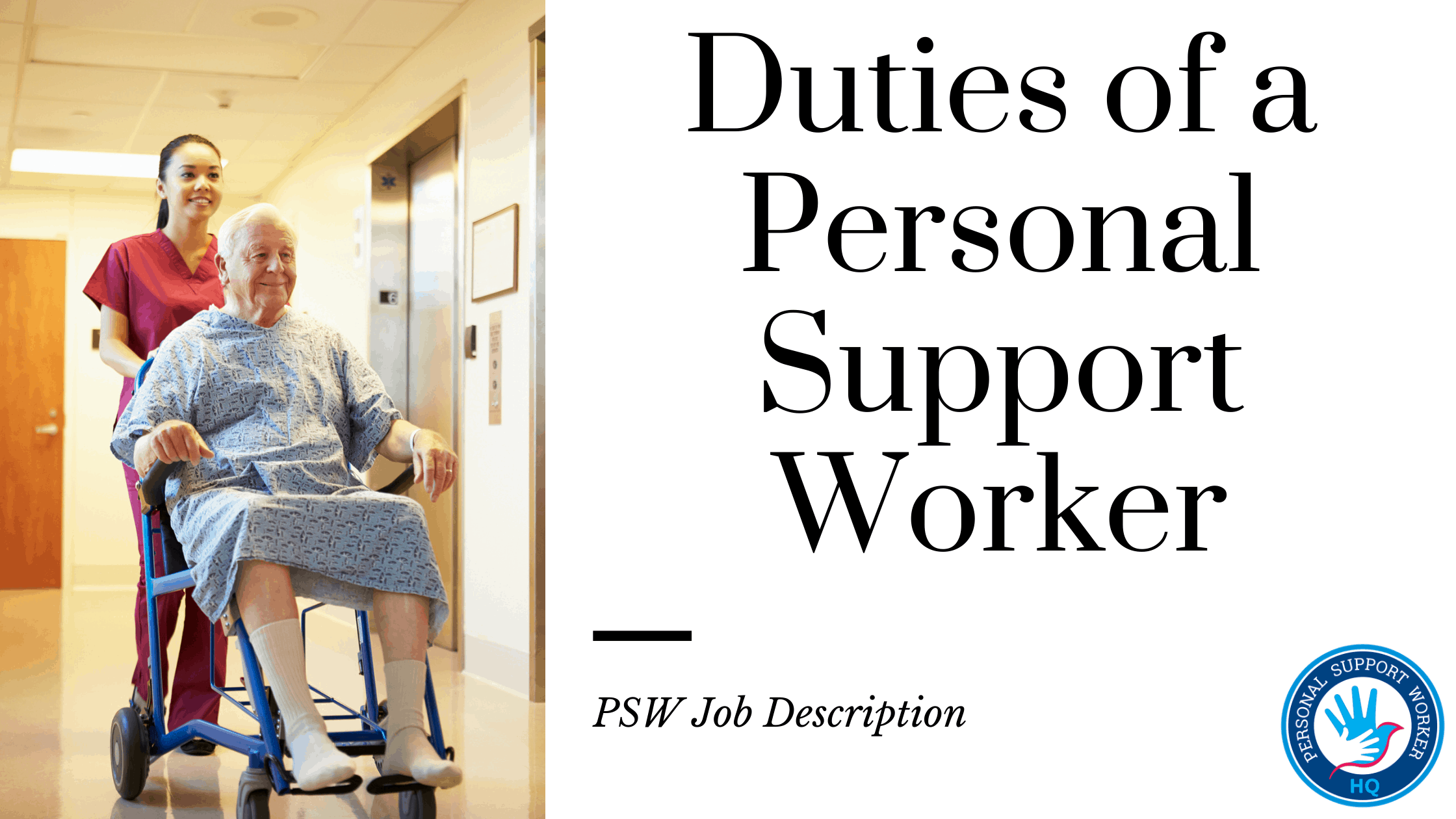
According to a Government of Ontario report, there are approximately 100,000 PSWs in Ontario.
Personal Support Workers (PSWs) work in a wide variety of settings.
According to the Health Professions Regulatory Advisory Council (HPRAC), there are no uniformly established personal support worker duties in the province.
College of Nurses (CNO) has stated that unlike Registered Practical Nurses (RPNs) and Registered Nurses (RNs), PSWs are primarily required to perform daily tasks for patients that are direct, front-line, and hands-on.
“The work of a PSW is directed by a plan of care developed by a regulated care provider. The PSW does not organize the care plan but is responsive to it in supporting the client.”
The fundamentals of a Personal Support Worker job description are the same everywhere, however; its scope of practice is governed by many factors such as:
- Type of setting (Private home, Long-Term Care home, Retirement home, Clinical care setting)
- Requirements of the family members or client when working in a private setting
- Policies and procedures of the clinical care setting
- Type of Personal Support Worker(PSW) training
- Type and amount of experience
- Legislation
Therefore, the PSW job description can be personalized and customized according to the type of support someone needs.
Often daily tasks performed are based on the patient-specific care plan put together by Registered Healthcare Professional(s).

Although the job description of a good Personal Support Worker is determined by many factors, however, one very important consideration to keep in mind is that, regardless of the experience and skills, a PSW always work with patients, residents, or a client whose health is fairly predictable and are considered to be medically and clinically stable.
PSW Job Description – General
The PSW job description will always vary but in general, some of the common duties are:
- Following the care plan, observing and reporting any substantial findings and/or changes in patient/resident/client’s behaviour to the appropriate registered member of the healthcare team.
- Working under the supervision of a Registered Healthcare Professional such as a Registered Nurse (RN) or a Registered Practical Nurse (RPN)
- Perform tasks delegated to them (only if they are trained to perform the delegated task)
- Assisting with ambulation, positioning, and transferring using mechanical lifts such as a Hoyer lift.
- Assisting or providing total personal care such as toileting, bathing, and perineal care.
- Assisting with eating, dressing, and grooming.
- Assisting nursing staff by answering call bells (In Hospitals and Long-Term care homes)
- Performing sitter duty or patient watch for confused patients in clinical care settings.
- Computer or paper documentation of Activities of Daily Living (ADL’s) and other findings.
- Reporting behavioural and clinical changes to a Registered Nurse, Registered Practical Nurse, Resource Nurse, or Manager.
- Self-actualization by helping patient/resident/client to reach maximum potential.
Besides the above-listed duties that a PSW can carry out, the Regulated Health Professions Act (RHPA) sets out guidelines that allow unregulated health professionals to perform certain controlled acts.
Additionally, PSWs are required to possess a skill set of abilities that will enable them to perform their job effectively.
These abilities include:
- Overall competency in working under pressure
- Experience in providing general care and support
- Knowledge of home care services
- Proficient in written communication
- Proficient in oral communication
PSW Job Description – Facility-Based Settings
Facility-based settings are institutionalized settings such as:
- Hospital,
- Nursing homes,
- Long-term care homes,
- Retirement homes, or
- Other similar facilities.
In such settings, PSW’s job depends upon the policies and procedures of the institution.
Some of the typical tasks associated with such settings are:
- Assist nurses and physical therapy staff with the personal care of patients and physical therapy goals.
- In long-term care: Assist in dementia care by doing cognitive activities.
- Paper or computer documentation
The work is always closely supervised by either a Registered Nurse (RN) or a Registered Practical Nurse (RPN).
PSW Job Description – Community-Based Settings
When working in such settings, PSW job duties include:
- Give personal assistance with toileting, bathing, and dressing
- Meal Preparation
- Walking the family dog
- Grocery shopping and
- Generally, assist the client with any activity they would do if able to live independently.
Other PSW Job Duties
Prior to the start of the shift, a PSW or personal care attendant must report to the nurse assigned to the patient and explore pertinent information that you may need during the day. If the patient is independent, these tasks can be performed by herself but if not, a PSW must ensure that they are completed and reported to a Registered Nurse (RN) or Registered Practical Nurse (RPN) at the end of the shift.
Personal Hygiene
- Mouth care – provide supplies and assist
- Bathing – Partial or full bed bath, set-up basin at bedside or shower
- Dress code and grooming including shaving
- Observe and report the following when providing personal hygiene: dry, cracked, swollen, or blistered lips, loose teeth and redness or swelling of the gums, condition of the dentures, and any other pain or discomfort.
- Also observe for any skin redness on the bony prominences such as coccyx, heels, elbows, shoulder blades, and back of the head.
Meals
- Set up a food tray in front of the patient
- Feed patient as directed. Please note if the patient has any swallowing difficulties, if the head of the bed needs to be elevated to a certain degree, and the type of diet the patient is on such as regular, diabetic, puréed, honey/nectar thick, etc.
- Measure intake – the amount of food from the tray. Sips, 1/4th, 1/2, 3/4th or full. Also, measure the amount of fluid intake.
Toileting
- Provide toileting to the patient according to the schedule using a bedpan, urinal, commode, or ambulate to the bathroom. Please note that when transferring the patient to the commode, you may need assistance from another staff depending upon how much the patient is able to participate in the transfer. Also, keep in mind the weight-bearing status when transferring and ambulating patients.
- If the patient is incontinent, discourage the use of a diaper. If the patient has a particular type of incontinence such as stress, urge, or overflow, please be aware of available products such as pads, liners, and mesh panties.
- Change incontinent pads and diapers while providing proper peri-care.
- Measure output. If incontinent, describe output as small, medium, or large. Also record the number of bowel movements including the consistency, texture, and amount (small, medium, or large).
Mobility
- If independent, encourage self ambulation.
- Provide personal assistance using a cane, walker, or during transfer.
- Encourage the patient to sit up in the chair, as directed.
- If the patient is on bed rest, it is very important for a PSW to reposition according to the protocol. The patient’s on bedrest need to be repositioned every two, three, or four hours depending upon the risk of skin care breakdown.
Safety
- If the patient is on any type of restraints, monitor the patient closely and report any changes.
- Wear protective gear such as a mask, gown, and or gloves if the patient is in any type of isolation (see also PSW dress code).
- Depending upon the risk of fall, monitor the patient closely.
- Ensure the bed is in the lowest position, call bells are within reach, and bed alarms are working.
Cognitively Impaired
- Confused, patients with dementia, delirium, or depicting aggressive behaviour need to be monitored very closely.
- Provide orientation to date, time, and place.
A PSW is also responsible for changing bed linen and keeping the room clutter-free.
PSW Tasks During Patient Watch
Close patient observation is often required in hospitals or other types of acute care settings.
Patients at a high risk of falling due to post-operative delirium or confusion due to some kind of disease process are required to be monitored twenty-four hours a day.
Resources you’ll need to become a Personal Support Worker
On this page, you can find anything there is to know about how to become a personal support worker, how to succeed as one, and how to continue your education. This is the place to come to and look for all the PSW resources and information that you may need on your journey as a Personal Support Worker.
PSW job interview questions
If you’re determined to pass your next PSW interview with flying colours, we’re here to help. PSWHQ has put together a thorough online guide with PSW interview questions and appropriate sample answers to these questions that hit the target, and are concise and supportive.
Performing well in the interview is just one part of many others needed to secure a PSW Job. First and foremost, you’ll need to have an impeccable résumé and cover letter in order to be called for an interview.
Guide to finding PSW jobs
After you have decided to become a Personal Support Worker and completed the course you are now at a point to start looking for work. It is important that you explore all the jobs listed under different job titles, which is why you should go through our ultimate guide to finding PSW jobs.
We also help you find PSW job postings from hospitals, long-term care homes, and community and private settings.
Advertising with PSWHQ
Over the past few years, PSWHQ has achieved a dominant ranking in major search engines such as Google and Bing. As a result, we offer a limited number of advertising opportunities to individuals, colleges, companies, and organizations we see as a good fit for the unique audience of PSWHQ.
FAQs
1. What should a personal support worker put on resume?
A personal support worker should put on their resume any relevant experience they have had. They can also list skills that are transferable to the caregiving industry, such as communication and empathy.
2. What are 4 things a support worker must be aware of when providing support for an individual?
Having a positive frame of mind. Being conscious of realistic expectations and constraints – making certain that you understand each individual, as well as their strengths, needs, aspirations, and support requirements. Consistency and the capacity to see things through to completion are essential. Professionals are human and nice, yet they are not dependent or reliant on others.
3. Can a PSW give medication?
PSWs can assist with the administration of oral pills, liquids, topicals, eye, ear, and nose drops, as well as transdermal patches. PSWs can also assist with the administration of intravenous medications. However, even with these dosage kinds, you must receive on-the-job training and practice before you can safely administer them.
4. What are the top 5 things that make a good support worker?
Here are the top five qualities to look for:
- They know when to step up and when to step back. Support workers should know when to provide the support you’ve requested, and when to let you do your own thing.
- Support workers understand the importance of communication
- Patience and a sense of humour are essential
- Dependability
- Trustworthiness.
5. What is personal support needs?
Personal support includes adhering to the assistance requirements of an established individualized plan and assisting with each of the following activities: bed washing, dressing, undressing, and grooming, among others. The use of suitable feeding practices while eating and drinking.
Personal Support Workers who hold a Personal Support Worker certificate from an accredited college are preferred, though not always required. Applicants may also hold a certificate that specializes in caring for the elderly, people with disabilities, or those recovering from surgery.









I had no idea what PSW’s do in a hospital setting. This is great information I have come across.
IT has helped me get some prospective on what I can expect to do if I work in a hospital.
Glad to know the article was helpful!
i am happy to read such posts
Hi there, I am very interested in the field and really enjoy your site.
I was wondering do you have any information regarding schools that train for PSW that are less expensive or are free. If i wanted to go to college to take it, then i would end having to quit my job. IAre there any schools out there that is lower price or free or apprenticeship for PSW??
I don’t want to take a loan or get oasp or owe money. I just want to go to school pay for it myself but I cannot afford hundred and thousands for dollars. I woudl greatly appreciate any help you can provide.
yours kindly
Michelle
Michelle…thank you for your wonderful comment!
Some of the District School Boards offer the PSW program for a very minimal fee. You can click here to read more on this.
There are many colleges that offer this program online as well. Fees for online programs are usually less as compared to traditional programs. Click here to read more on this.
And to explore all other options for taking a PSW course in Ontario, you can click here.
Hope this helps. Let me know how it goes.
All the best!
It’s such a relief to know.ost of what it entails regarding a PSW, now I am ready to pursue my career with a sound n focused mindset . Thank u so much.